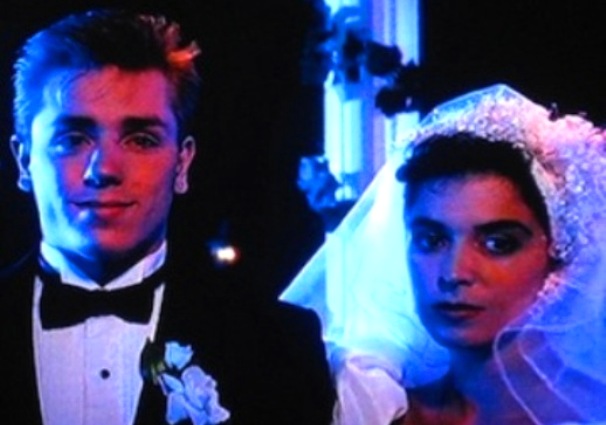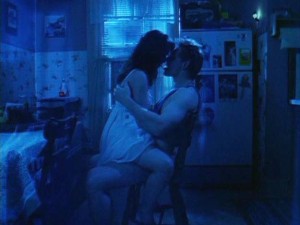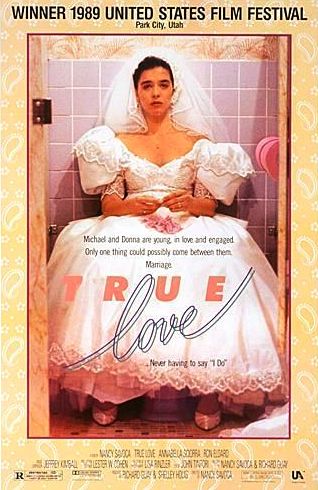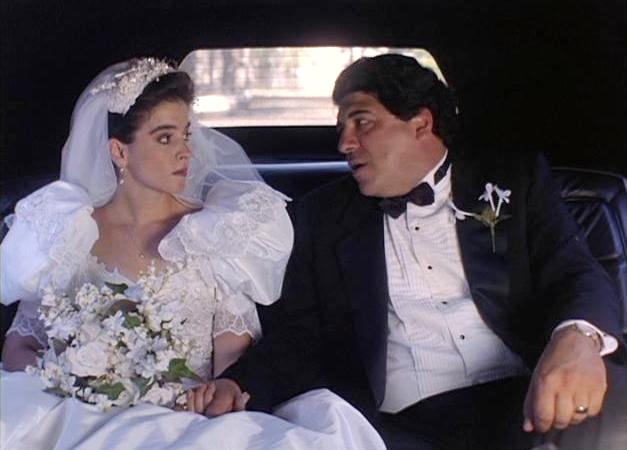
“Donna, if you’re not sure about this whole thing… this marriage… you could change your mind.” – Father to daughter
True Love (1989) by Nancy Savoca is one of the true underrated masterpieces of the American cinema, an entertaining turbulent love story that begins in the short days before an Italian-American wedding between Donna (Annabella Sciorra) and Michael (Ron Eldard). They look like a couple that needs a little more time to square the pegs of their relationship, but the reception hall, the dresses, the poured in gifts, and most importantly, the neighborhood expectations are so high that there’s nothing left to do but to move forward.
Donna comes off as a battle-ax to the guy’s autonomy. The first time I saw “True Love,” I believe I was on Michael’s side for the longest time. All the guy wants is a bachelor party without it being interrupted, without a curfew, without being hectored by fiancé Donna to “come over afterwards.” At the bachelor party he inevitably has, it would be a good guess to say he does the same partying he would do on any other given night outside the stag night custom. Stag film, dancing with the local hussy, shots ’round the house, cruise around town, hit Atlantic City at dawn, chow down White Castle burgers.
We start to gather that Michael’s clowning around isn’t going to end after they get married. “I just want to go out. Just for a couple hours… One hour, okay?” He’s the kind of guy who is willing to say no to his wife first before he would ever say no to his friends. “He’s a little wild,” Donna’s father (Vincent Pastore) observes, “but that will change.”
Looking around the film, around New Jersey, Michael comes off as one hell of a good-looking catch. He has a charismatic power to him that draws people in. He’s certainly a lot better off than Brian (Michael Selkirk), a directionless goof who spends his time courting a single mother (Star Jasper) he doesn’t look maturely equipped to handle. Michael has deceiving but persuasive appeal, and he is at least “manly,” not a Brian-like goof. Michael could exist in a Scorsese movie, Brian would get whacked in the first reel.
Michael’s wild nature is an indicator of why maybe Donna has to bust his balls a bit. If Michael didn’t have a curfew, perhaps he would stay out all night and fall asleep on someone’s rug night after night. He’s pretty chummy with the deli store owner he works for, and Michael yet is hesitant about bridging a fuller partnership with him for a career – he’s non-committal even when it comes to supporting himself and future family.
“I had the right idea tonight, Donna. I wanted to go out and be with my friends! My very good friends!” Goddamn you, Michael. You now have a bride tearing up her dress, bawling out on the toilet. It’s the most famous shot of the film, and I think, the seminal image in one framed shot that sums up what failed marriage looks like.
 But they have such intense and magnetic sexual chemistry. They are not supposed to see each other the night before the wedding, but their loins are on fire for each other. Savoca amps up the bluesy, soaring love song “How ‘Bout Us” by Champaign to accompany Donna and Michael for a tryst that only happens for hyper-sexual movie characters. Blending aggrandized music, blue-tint glow of the night coming in from the windows, inflamed emotions, and special erotic detail… it is simply one of the most powerful sex scenes ever filmed, because it hot and because it has an artistic statement. Donna is disrobed, and the visual wipe transitions to Donna having her wedding dress slipped over her the next day. Donna is sure she wants to get married. Michael is sex and excitement.
But they have such intense and magnetic sexual chemistry. They are not supposed to see each other the night before the wedding, but their loins are on fire for each other. Savoca amps up the bluesy, soaring love song “How ‘Bout Us” by Champaign to accompany Donna and Michael for a tryst that only happens for hyper-sexual movie characters. Blending aggrandized music, blue-tint glow of the night coming in from the windows, inflamed emotions, and special erotic detail… it is simply one of the most powerful sex scenes ever filmed, because it hot and because it has an artistic statement. Donna is disrobed, and the visual wipe transitions to Donna having her wedding dress slipped over her the next day. Donna is sure she wants to get married. Michael is sex and excitement.
 The movie’s message is clear as day, the ending is a lament for marrying too young. Supposedly, a few younger people are confused by the ending. You’re in for this film, you’ll allow for this movie to cut you deep, especially if you are planning or impending marriage, or been through a high-wire toxic one. Feeling that you’re going to disappoint those around you isn’t a reason to get married. If it was true love, then that wouldn’t be brought up. Weddings are fun, too, even if they are on the verge of disaster. Only on a fantasy day like your wedding can there be blue mashed potatoes. The rituals, the coordination, the spread, the upgrades – all of those things can be hysterical.
The movie’s message is clear as day, the ending is a lament for marrying too young. Supposedly, a few younger people are confused by the ending. You’re in for this film, you’ll allow for this movie to cut you deep, especially if you are planning or impending marriage, or been through a high-wire toxic one. Feeling that you’re going to disappoint those around you isn’t a reason to get married. If it was true love, then that wouldn’t be brought up. Weddings are fun, too, even if they are on the verge of disaster. Only on a fantasy day like your wedding can there be blue mashed potatoes. The rituals, the coordination, the spread, the upgrades – all of those things can be hysterical.
A year later, “GoodFellas” (1990) by Martin Scorsese was the epitome of the Italian-American underworld. But here, “True Love” is the Italian-American middle-class (if the name Scorsese had been attached to “True Love,” this would have been praised to the heavens. It would have been a celebrated classic by now, instead of an under the radar one.) Once you discover it, please don’t stop there. Savoca has built a career of making severely impressive and thought-provoking pictures about women, most notably including “Dogfight,” “Household Saints” and the current “Union Square” now in theaters.
104 Minutes. Rated R.
Film Cousins: “Dogfight” (1991); “Muriel’s Wedding” (1994); “Marriage is a Crazy Thing” (2002, South Korea); “Waitress” (2007); “Jumping the Broom” (2011); “Union Square” (2012).





